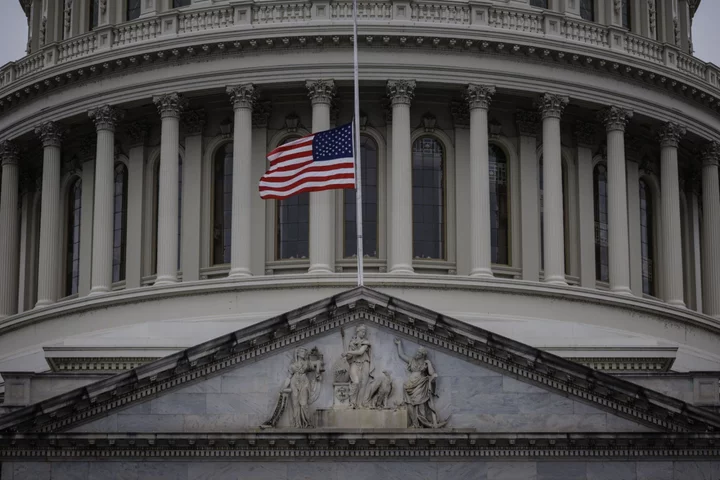Longer lines at airports, missed paychecks, shuttered national parks and delayed economic data — those are some of the potential impacts of a looming federal government shutdown.
Infighting among House Republicans is driving the government to the brink of a potentially protracted shutdown this weekend. Barring a breakthrough, federal funding will lapse at midnight on Sept. 30.
Not all services would abruptly stop. Medicare payments and efforts to safeguard nuclear weapons would be unaffected. You’d likely still get mail and be able to travel on Amtrak. You wouldn’t, however, be able to get married in DC courts.
Many federal employees are likely to be furloughed, but some would be made to work without pay until the shutdown ends. The last major shutdown in 2018-2019 lasted 35 days.
The Office of Management and Budget has collected agency contingency plans that outline what happens in the event of a shutdown. Here are some highlights:
Labor
- Among the Department of Labor agencies that would “completely cease operations” is the Bureau of Labor Statistics, which publishes the monthly jobs report. That and other delays to economic data from the government would have policymakers and investors looking to third parties to try to fill in the blanks on the health of the economy.
- The Federal Mediation and Conciliation Service, charged with promoting labor-management cooperation, would have to cut back its work amid a strike by the United Auto Workers.
Federal Reserve
- Federal Reserve activity would be unaffected, meaning the central bank could still raise interest rates at its next meeting Nov. 1.
Financial Regulators
- The Federal Trade Commission would stop “the vast bulk of its competition and consumer protection investigations.”
- The Securities and Exchange Commission wouldn’t review or approve registrations from investment advisers, broker-dealers, transfer agents, rating organizations, investment companies and municipal advisors.
- The Commodity Futures Trading Commission would stop "the vast bulk of its operations," including most enforcement division functions, but it'll keep up work that would allow the "commodities, futures and swaps markets to continue to operate and that will enable trading on those markets to continue."
Treasury, IRS
- The Treasury Department broadly outlined that work would continue for those supporting the White House on market and economic updates, policy work and other items required to fulfill the president's constitutional authorities. Among activities that would cease during a shutdown: "routine international engagement, domestic finance, and economic policy" as well as processing of cases under the Committee on Foreign Investment in the United States.
- The IRS would stop picking up the phone and answering the 46,000 calls it receives on average daily, while most tax administration functions stop.
- The Treasury would keep working to implement tax credits created or expanded under the Inflation Reduction Act, though guidance on claiming incentives for hydrogen, sustainable aviation fuels and other ventures could be delayed.
- Businesses and individuals who requested six-month extensions for their tax returns in April are still required to file by Oct. 16.
Emergency Relief
- A shutdown would “create an increased risk” Federal Emergency Management Agency relief funds would be depleted, and “complicate new emergency response efforts if additional catastrophic disasters occur.”
Energy & Environment
- Though the Interior Department has issued permits for some offshore oil and gas drilling during at least one previous shutdown, it's not clear that would happen again.
- A funding lapse would paralyze other work to develop required environmental analyses for energy projects, highways and other infrastructure.
- The Environmental Protection Agency can continue some IRA-funded activities as well as other exempted work, such as settlement-funded cleanup at some Superfund sites.
- The White House has warned most EPA-led inspections at hazardous waste sites, as well as drinking water and chemical facilities, would stop.
- The Energy Information Administration, which publishes snapshots of US oil inventories and fuel demand, would continue to collect and publish data on schedule, at least initially.
- The National Nuclear Security Administration would focus on “maintenance and safeguarding of nuclear weapons; international non-proliferation activities; and servicing deployed naval reactors.”
- The Nuclear Regulatory Commission would stop licensing, certification and permitting and inspection activities, along with emergency preparedness exercises.
Read more:
- The Shutdown Seven: Here Are Lawmakers to Watch in Negotiations
- National Park Closures in Shutdown Could Ignite Partisan Feuding
- Your Questions Answered on US Government Shutdown: QuickTake
- Republican Disarray Sends US Veering Toward Government Shutdown
- Government Shutdown Poses ‘Seismic’ Threat to Pollution Controls
- US Government Shutdown Would Hobble SEC Oversight, Gensler Says
Transportation & Travel
- Travelers could face delays as air traffic controllers and Transportation Security Administration officers working without pay could lead to higher rates of no-shows, as happened in 2019.
- Amtrak would keep transporting passengers.
- Passports and visas would still be issued at consular offices worldwide, provided “there are sufficient fees to support operations.”
Defense
- Efforts “to defend the nation and conduct ongoing military operations” would continue, but most civilian Defense Department employees would be furloughed.
- Burials and tours at Arlington National Cemetery would continue.
- Of the Department of Homeland Security's 256,972 employees as of June, almost nine in 10 are deemed exempt and would report to work, including almost 145,000 whose work is deemed necessary to protect life and property.
Health & Social Security
- Covid-19 response and research, including vaccine and therapeutic development, would carry on under the Department of Health & Human Services.
- The National Institutes of Health might have to postpone clinical trials for diseases like cancer or Alzheimer’s, according to the White House.
- Medicine-price negotiations could be sent into disarray, as some drugmakers face an Oct. 2 deadline to report data to Medicare for use in determining new prices.
- Food stamps for low-income people, the disabled, and others could be delayed.
- Social Security checks would be delivered, and applications for benefits processed, but people would not be able to verify benefits or replace Medicare cards.
Parks
- Most national parks would likely be shuttered, turning away visitors and crippling businesses in the $800 billion outdoor recreation economy. Easily accessible sites would generally remain so -- but without customary staffing and resources.
- Museums including the Smithsonian and National Gallery of Art could close in a protracted shutdown.
- The “Fat Bear Week” tournament run by Alaska’s Katmai National Park would go dark.
- Cemeteries, monuments, and visitor centers worldwide housed under the American Battle Monuments Commission also would shutter.
Housing
- “Nearly all” Department of Housing and Urban Development fair housing work would stop, as would some monthly subsidy programs, including potentially for public housing operations.
- HUD’s work for the Federal Housing Administration’s insured mortgages portfolio and Ginnie Mae’s work in the secondary mortgage market would be unaffected.
Commerce
- Review or issuance of loans under the Small Business Administration would cease, including those for women-owned and service-disabled, veteran-owned small businesses.
- Commerce Department collection of decennial census data probably would continue, as would forecasting and warnings around weather, water, and climate.









